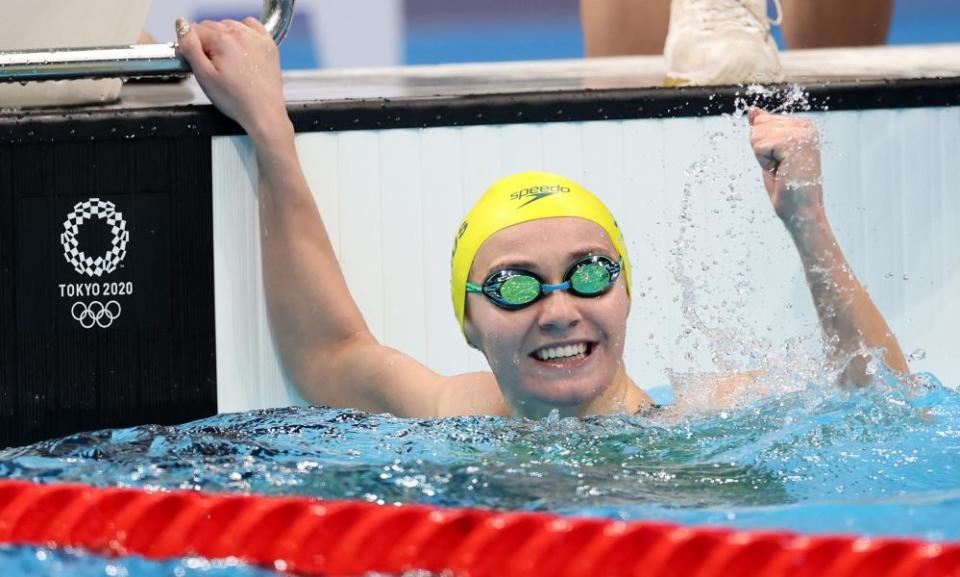Ariarne Titmus wins another Olympic gold for Australia as Katie Ledecky fades

A new queen of the pool has been crowned. Twenty-year-old Australian prodigy Ariarne Titmus emphatically took the women’s swimming crown from American Katie Ledecky at the Tokyo Games on Wednesday. Having conquered the five-time Olympic gold medallist in the marquee women’s 400m freestyle on Monday, Titmus was again too fast in the 200m freestyle final.
The Tasmanian’s two victories in 48 hours – only the first and second time Ledecky has lost individual finals in her three Olympic outings – have seen her usurp the 24-year-old as the female swimmer to beat. Titmus can add to her medal haul in the days ahead; she will again face Ledecky in the women’s 800m freestyle, and the pair will likely face off during the women’s 4x200m freestyle relay.
Related: Kaylee McKeown secures another gold for Australia as Olympic swimming tally rises
Tears of joy flowed for Titmus as she stood on the top step of the podium for the second time at these Games. Her coach Dean Boxall, who was thrust into the spotlight for his celebrations on Monday, was once again ecstatic – if somewhat less animated.
“I’m pretty good at containing my emotion,” said Titmus. “That’s something I had to do really well after the 400m, because the 200m was right after. I think it’s a bit of a skill trying to contain it and back up. But now that I haven’t got a swim tonight I kind of let it out a bit. Seeing him emotional makes me emotional. This is a great partnership. This is not just me winning – this is him winning as well.”
Titmus began slowly, touching fifth at the first turn, but moved up in the second lap as her rivals struggled to shake her. The Australian moved up to fourth at the 100m and was third at the final turn. She was then unstoppable in the last lap, shaking off Hong Kong’s Siobhan Haughey to break the Olympic record. Penny Oleksiak took bronze, with Ledecky back in fifth.
“I’m bloody exhausted,” Titmus said. “That was a tough one – I knew Siobhan really wanted this, I could tell by the way that she swam yesterday. So I knew it would be tough to beat her. Honestly it’s not the time that I thought I could do this morning, but it’s the Olympics and there’s a lot of other things going on, so it’s just about winning here. I’m very happy.”
Australia has a historic pedigree in the women’s 200m freestyle. Susie O’Neill – in Tokyo as deputy chef de mission for the Australian Olympic Committee – won gold in 1996, while Australian swimming legend Shane Gould won the race at the Munich 1972 Games.
The Australian men added bronze to the nation’s medal tally in the final race of the morning, finishing third in the 4x200m freestyle relay. The reigning world champions were unable to stay with a dominant Great Britain, but outswum their American rivals to win bronze, with the Russian Olympic Committee in second.
In a nod to an iconic line from former rugby league player Matthew Johns, relay team member Thomas Neill described the bronze medal as “better than Lego”. Neill later added: “We had to ride the wave of the Brits – I tried to do that, and executed a good backhand. We came away with the bronze medal – stoked!”
Ledecky bounced back from her 200m and 400m freestyle defeats to win the 1500m freestyle – her first gold medal of Tokyo 2020 – as the long-distance event made its debut on the women’s Olympic program. The American led from the front, establishing clear water behind her after just a handful of laps and never showed any sign of fatigue. She was followed in by compatriot Erica Sullivan, while Germany’s Sarah Kohler won bronze.
In the men’s 200m breaststroke semi-final, Australian medal prospect Zac Stubblety-Cook qualified fastest for the medal race. Stubblety-Cook holds the second fastest time in history in the discipline, which he recorded just last month. Britain’s James Wilby and Dutchman Arno Kamminga are among the other medal hopefuls who will meet Stubblety-Cook in the final on Thursday.
In the first event of the morning, the men’s 100m freestyle semi-finals, Kyle Chalmers – the champion in Rio – qualified comfortably for Thursday’s final. The Russian Olympic Committee’s Kliment Kolesnikov was the fastest qualifier, but faces a tough battle with Chalmers and American Caleb Dressel in the gold medal race.
The swimmers will return to action this evening for a night of heats. Australia’s Kaylee McKeown – who won gold in the women’s 100m backstroke on Tuesday - will be back for the 200m.

 Yahoo Finance
Yahoo Finance 